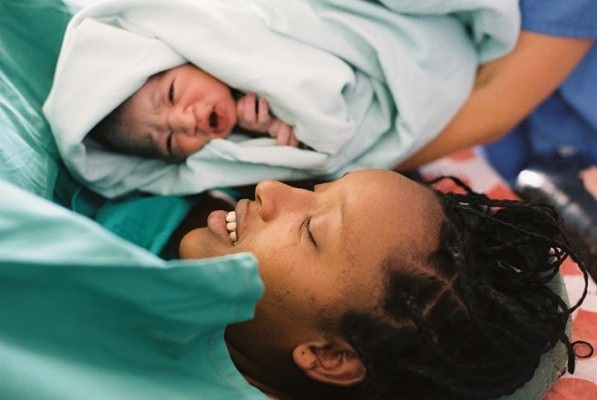March 12th
The saddest photograph that I have taken in Gimbi is one that shows a brown cardboard box sitting on top of a silver pedal bin. The box is one that previously had latex gloves for surgery packed in it and this old content is printed in large blue letters on the sides of the box. The box top is closed, in time honour fashion by folding the top edges inside on one another, as there is no tape or string available here. The only clues about the contents of the box are the letters "F1" written in black marker pen on the top.
F1 is a bed number (female ward-bed 1) and the box contains the body of the dead baby of the woman in this bed. Sadly even I can't remember why this particular baby died as the death of a baby occurs so frequently here. Looking at the statistics for February more than 1 in 7 babies were stillborn or died soon after delivery- as a result it is not uncommon to arrive in the morning and find one or more cardboard boxes packed and waiting for the parents to take when they leave the hospital.
Not surprisingly women protect themselves against the chances of pain of loss by an apparent refusal to become attached to their babies until it is born (when survival even if for only a short time are more guaranteed). When ultrasound scans are performed in clinic in is unusual for a woman to want to look at the screen or to know the sex of the baby. Telling a woman that her baby has died (something I have to give on an almost daily basis) is met with resignation- in my time here I have seen only three women cry although the majority of them do appear very sad at the death of their baby with fewer of the broad Ethiopian smiles and an introversion in speech and manner which is uncharacteristic. Women arrive with nothing in labour for the newborn baby which is partly the fact that many of them own little but even the better off do not tempt providence by arriving with so much as a blanket before the baby is born.
The midwives also have what on first encounter can appear to be a shockingly casual attitude to the death of a baby- but this is just a way of getting through a daily event without becoming emotionally involved (as to do this would make coming to work very draining psychologically). Unfortunately this attitude from mothers and midwives leaves them where we were in the UK 20years ago, with a dead baby whisked away with no enquiry about whether the mother wants to see, let alone hold it. There is little discussion about what happened- and although there is often little to tell by way of medical explanation (due to the lack of any post-mortems or investigations) we can still offer advice about having more care next pregnancy but it sometimes is difficult even to get this information translated & relayed to the woman.
So why do so many babies die you might ask? In fact it is very hard to fathom even when you are "part"of their care- a significant number of babies die before the onset of labour (or arriving at the hospital for any care), further investigation if it were possible might reveal that the baby was not growing properly or that there was a congenital abnormality but the sheer numbers suggest that the poor nutritional status, chronic parasite infections and social deprivation in these women must also be contributing to this sad outcome of their pregnancy. There are also a number of babies that die following prolonged labour at home where the women come too late for us to be able to save the baby who has become very short of oxygen and may also be infected. In addition there are a much smaller number of babies who die because of monitoring or care issues after delivery, which could have been avoided if things were done differently but the attitudes to the baby are such that it is difficult to get rapid changes in practice.
A small number of babies die in Gimbi hospital as a result of prematurity- these are babies that are born 6-8weeks early who struggle through for days or even weeks but finally succumb to feeding issues and infection. We don't see more extreme prematurity at the hospital, but as labour must happen in at least 10% of women before 32weeks I can only assume that the reason is that the families realise there is no hope for the baby at this gestation and so don't waste time, money & effort in coming to hospital, choosing instead to stay at home and let natural course of events occur. The hospital deaths due to mild prematurity feel particularly tragic, as I know that if these babies had been born in any developed country they would survive with only minimal intervention but unfortunately even that level of care is not available here and so survival is only possible if the baby is able to put up a fight against nature.
Thankfully some premature babies are amazingly strong- yesterday I saw a woman who came to outpatients with a tiny, 6-day old baby girl in her arms. (1.61kg on weighing her), she wanted the baby to be checked as she had been born prematurely. The mother had been attending outpatients regularly as she had a history of delivering four previous babies at about 28weeks (7 months) gestation (they talk in months which can be confusing) who as expected died soon after birth. There was not a lot we could do to ensure a better outcome for this pregnancy but as there is evidence that regular antenatal care can prolong pregnancy in this sort of history, we encouraged her to attend regularly. Not sure it was anything to do with the clinic visits but this time she did get to 33weeks gestation (which was a date confirmed by ultrasound) before going into labour and had delivered her baby at home. Miraculously this baby was vigorous with no apparent breathing problem and a good suck/swallow reflex (witnessed by the fact that at 6 days of age it had no dehydration)- I contemplated whether we should admit mother and baby to the ward but the risks of hospital acquired infection (including TB) are not insignificant and the reality is that there is very little that the mother was not already providing that we could do so I explained about ensuring the baby was kept warm (we recommend "kangaroo care" with skin-skin for long periods) and recommended breast feeding every 2-hours if possible and she went home again-I just hope to see her in clinic again next week( this was suggested) as if she doesn't come I will never know if it is because the baby is doing well or has gone the same way as its siblings.


No comments:
Post a Comment